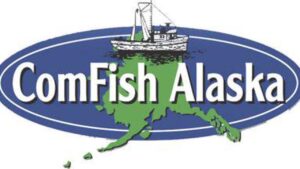
Participants in ComFish Alaska 2023, undeterred by a spring snowstorm that halted jet traffic in and out of Kodiak for a day, tackled climate challenges to fisheries, including plastics pollution and prospective economic and environmental benefits of the mushrooming kelp mariculture efforts.
The state’s biggest and longest-running commercial fisheries trade show, which began in a borrowed Alaska National Guard wall tent in 1980, incorporated into its March 16-18 program in Kodiak a mix of presenters ranging from harvesters, fisheries managers, federal and state legislators to historians and experts in marine debris and kelp mariculture.
The event also featured 46 trade show booths offering fishing marine supplies, vessel permits and sales, expertise in satellite technology, health care, recycling, seafood marketing and more.
At a forum on federal legislation during event’s first day, Rep. Mary Peltola, D-Alaska, praised the recent approval of the Biden administration in favor of the Willow oil exploration project on Alaska’s North Slope, and the U.S. Environmental Protection Agency’s veto of the Pebble mine project in Southwest Alaska, protecting the Bristol Bay watershed under the Clean Water Act.
The Wild Fish Conservancy’s lawsuit to shut down Southeast Alaska troll fishery is one of the least effective ways to help the killer whales in Puget Sound, Peltola said, adding that the Southern Resident orca whales are hundreds of miles away from that troll fishery and the Alaska delegation has filed a brief challenging the lawsuit.
“We will not let our Alaska small boat trollers be bullied,” she remarked. “I’m hopeful that NOAA and the state will find a path for us to have a king salmon fishery again this year, as we have for over 100 years.”
Peltola described bycatch issues as “the elephant in the room,” adding that improvements are needed in bycatch regulations.
“Some people say that there’s nothing that we can do, or climate change is to blame and that’s it. And I’m just not willing to write off salmon and write off the people that depend on salmon to survive,” she said.
Still, those changes will take time and it could be 30 years before our fisheries fully recover, she remarked.
Sen. Lisa Murkowski described the declines in salmon, halibut and crab fisheries as being in crisis levels and said that a number of responses are needed.
“I don’t like to use the word ‘crisis’ lightly, but I think crisis is the appropriate word here. I wish that we could tell you the exact causes. I wish there was one single thing to explain everything,” she said, adding that current fisheries management doesn’t always reflect what’s happening in the ocean.
“What we’re seeing now, the changes that we’re seeing and that we’re not understanding, are happening at a rate that our systems are not designed to be responsive to,” she stated. “When we see acts of God that are becoming trends of nature, it really is going to require us to reevaluate processes, to respond to them and address them.”
